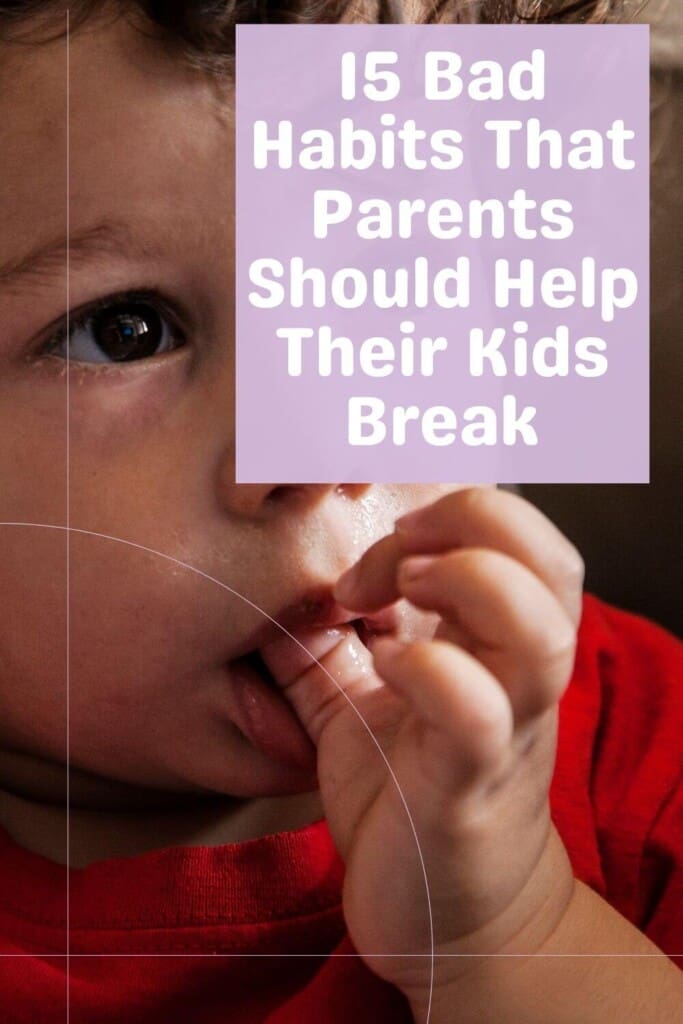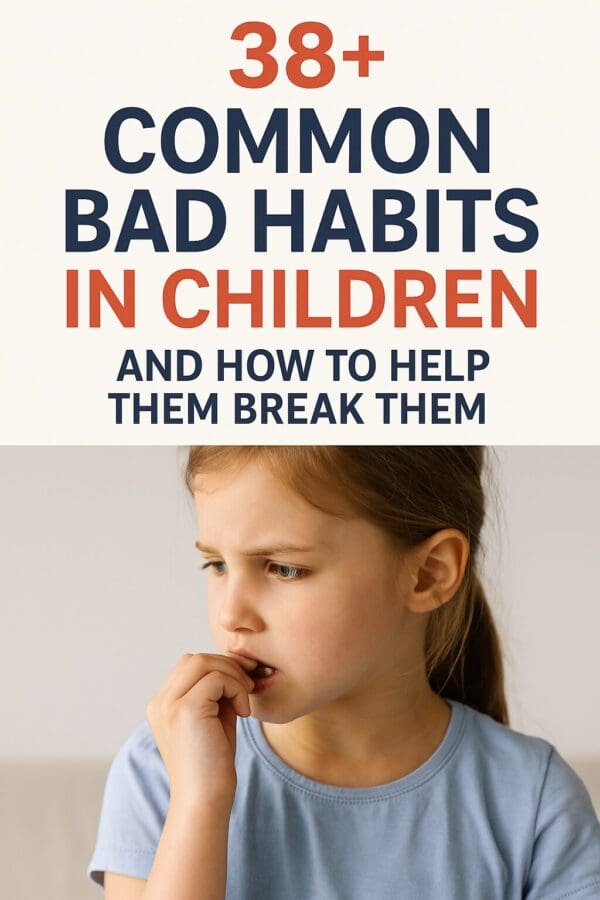38+ Common Bad Habits in Children and How to Help Them Break Them
We all want the best for our kids—happy hearts, kind words, and healthy habits. But let’s be honest: sometimes, little ones pick up behaviors that leave us scratching our heads or quietly whispering, “Where did they even learn that?”
From nose-picking to constant interrupting, there are plenty of common bad habits in children that can affect their development, relationships, and even self-confidence. The good news? With patience, empathy, and a few positive parenting strategies, these habits can be addressed gently and effectively.
Let’s explore the most common culprits—and what to do about them.
Heads up: This post may include affiliate links. As an Amazon Associate, I earn from qualifying purchases—at no extra cost to you. Full privacy policy and disclosure here.

🚩 Why Do Kids Develop Bad Habits?
Before we dive into the list, it’s helpful to understand why kids develop certain behaviors. Many common bad habits in children stem from:
- Emotional regulation struggles (e.g., biting nails during stress)
- Boredom or lack of stimulation
- Imitation of others (parents, siblings, peers, media)
- Unmet needs or seeking attention
- Developmental phases (some habits are age-appropriate but outgrow naturally)
👉 Check out these gentle parenting discipline strategies that help correct behavior without yelling or shame.
📝 List of 40+ Common Bad Habits in Children
1. Nail-Biting
Often triggered by stress or boredom.
🛒 Anti-nail biting polish for kids
2. Thumb-Sucking
Comforting for babies but problematic if it persists past age 4.
🛒 Thumb guard for children
3. Hair Pulling or Twirling
4. Picking Nose (and Eating It 🙃)
5. Interrupting Constantly
6. Talking Back
7. Whining or Complaining Frequently
8. Lying or Exaggerating
9. Blaming Others
10. Cheating During Games
11. Ignoring Instructions
12. Excessive Screentime
Learn how to redirect screen time with these parenting books.
13. Slamming Doors or Throwing Toys
14. Being Disrespectful to Adults
15. Bad Table Manners (like chewing with mouth open)
16. Using Inappropriate Language
17. Tattling or Over-Reporting
18. Overreacting to Small Problems
19. Sneaking Treats or Breaking Food Rules
20. Talking During Quiet Time at School
21. Pretending Not to Hear You
🛒 Kids’ chore chart for better follow-through
22. Overstimulation from Loud Play or Shouting
23. Ignoring Hygiene (like not brushing teeth)
🛒 Fun musical toothbrush for kids
24. Tantrums Over Small Things
✅ Try these positive reinforcement phrases to encourage calmer responses.
25. Fidgeting or Not Sitting Still
26. Biting Pencils or Toys
27. Being Too Rough with Pets or Siblings
28. Refusing to Share
29. Bossing Others Around
30. Procrastinating or Avoiding Chores
31. Eye Rolling or Sarcasm
32. Constant Complaining of Boredom
🛒 Activity cube for quiet play time
33. Over-Apologizing or Undervaluing Themselves
✨ Boost their confidence with these words of affirmation for kids
34. Being Too Hard on Themselves
Try these 8 ways to battle the “I can’t do it” attitude
35. Disregarding Others’ Feelings
36. Making Fun of Peers
37. Constant One-Upping
38. Exaggerating Illness or Ailments for Attention
39. Obsessing Over Winning or Perfectionism
40. Avoiding Eye Contact (when talking or being corrected)
💡 How to Gently Break These Habits
Breaking habits doesn’t require punishments or lectures. Use redirection, positive reinforcement, and empathy.
And for deeper transformation, I highly recommend Positive Parenting Solutions — the course that changed how I parented completely.
📘 Related Outbound Resources
❓ FAQ: Common Bad Habits in Children
Are bad habits in kids normal?
Yes! Most bad habits are developmentally typical and fade with gentle guidance.
Should I punish my child for a bad habit?
No. Punishment often backfires. Try positive phrases and redirection instead.
What if my child won’t stop a habit?
Stay consistent. Use praise for progress and check if there’s an underlying cause (stress, anxiety, etc.).
When should I worry about a habit?
If it disrupts daily life, social skills, or emotional health, consult your pediatrician.
Can parenting courses help?
Absolutely. This course is gold for managing behavior without yelling or shame.
🎯 Final Thoughts: Be Patient, Be Kind
All kids pick up habits—it’s part of learning how to navigate the world. With understanding and consistency, even the trickiest habits can be turned into opportunities for growth and connection.

💬 Have you seen any of these habits in your child? Share your experience in the comments—let’s support each other.
